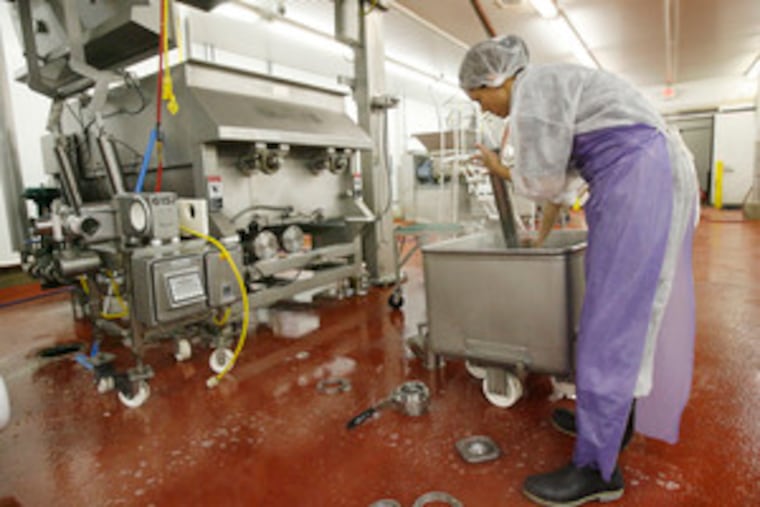From Quakertown: All-natural dog food
Dressed in a mesh bodysuit, white hairnet, and purple apron, Litza Flores ran her finger along the top of the 3,400-pound pressure cooker one last time to make sure it was clean.

Dressed in a mesh bodysuit, white hairnet, and purple apron, Litza Flores ran her finger along the top of the 3,400-pound pressure cooker one last time to make sure it was clean.
"Are you ready?" Flores asked Susan Gee, the quality assurance manager at the Quakertown dog-food plant.
Gee pulled out a swab and dabbed the stainless-steel machine. If the daily high-pressure wash, or the chemical foam bath, or the chlorine hand-scrub had left behind any trace of protein on the giant pressure cooker, the chemical swab would find it.
"A good flashlight helps, too," said Gee, whose job is to keep the plant operating at human-food standards.
The kettle was spotless during the inspection at the end of work Tuesday. And Flores was one step closer to earning a Wal-Mart gift certificate for keeping her sanitation record pristine.
Freshpet, the Secaucus, N.J., company that owns the plant, has standards. The manufacturer of all-natural dog food, launched last summer, began shipping products from the Quakertown plant in August to just 75 stores. By the end of 2006, they were in 200 stores. That is expected to grow to 1,000 by next month.
Sales projections for the year have risen to $50 million from $10 million to $15 million. They are being driven by a big industry recall during the spring and by pet owners who increasingly treat their animals as family members and demand a greater variety of healthy, tasty treats for their pets.
"I think it is a new initiative in the pet-food category that will continue to grow," said Jim Kidwell, marketing manager for Family Owned Markets, which carries Freshpet's Homestyle brand at its 12 grocery stores in Pennsylvania and Maryland. "There are a lot of people out there who view their pets as kids."
Last year, Americans spent $15.4 billion on pet food, according to the American Pet Products Manufacturers Association. This year, that number is projected to reach $16.1 billion. That is up from $12.8 billion six years ago.
While large manufacturers are consolidating - Nestlé S.A. bought Ralston Purina Co. in 2001, and Del Monte Foods Co. bought the Meow Mix Co. and Milk-Bone in 2006 - smaller companies also are finding their footing. That's because the pet-food market is becoming increasingly diverse, said Mark Finke, pet-nutrition expert for PetSmart Inc., a retailer of pet products.
And pet parents - a nomenclature the industry coined to describe passionate pet owners - are creating just the market for firms such as Freshpet, which mixes brown rice, carrots, peas and flaxseed oil with meat in its dog food.
"Why would they feed them stuff they'd never feed their children?" asked Scott Morris, Freshpet's cofounder and head of marketing.
At the 30,000-square-foot Quakertown plant, about a dozen workers churn out two brands of sausage-shaped product: Homestyle Select and Deli Fresh. Neither was recalled.
To assure freshness, the food is refrigerated at 34 to 38 degrees and must be sold within 90 days.
The pet-food scare began late in January when the first deaths of dogs and cats were reported. So far, the Food and Drug Administration has received reports of 15,000 deaths, although it cannot confirm that they were linked to a poisonous ingredient from China that caused the recall.
Freshpet says it now uses only domestic ingredients. In March, the company cut its European supplier of taurine, an amino acid. It wanted to avoid any negative perception customers might associate with a foreign supplier, Morris said.
The company has outperformed the industry trend so far this year. Since December, sales of the top 35 dog foods have declined more than 9 percent, according to Information Resources Inc., a Chicago research company.
At Freshpet, sales nearly doubled during the same period.
"There are not a lot of times in life you get in front of things," said Morris, who worked at Ralston Purina and then Meow Mix before colaunching the company. "But we were in front of it when the recall happened."
But whatever boost the recall gave Freshpet might be waning.
Opinion surveys in April and May by the Pet Food Institute showed that 73 percent of consumers were confident or very confident that their pet food was safe.
More on Freshpet, plus updates on the recall of mainstream brands: http://go.philly.com/health
EndText